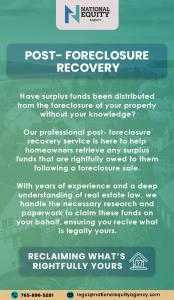
Understanding Surplus Funds: Rights and Eligibility Explained
Surplus funds are the funds generated from the sale of a foreclosed property when the auction price is higher than the total amount owed on the property.
Foreclosure can be a daunting process, involving legal complexities and emotional stress. Yet, amidst the challenges, there exists a lesser-known opportunity for homeowners: surplus funds. Understanding what surplus funds are and how they can be reclaimed is crucial for anyone navigating the aftermath of a foreclosure or tax sale.
What Are Surplus Funds?
Surplus funds, also referred to as excess proceeds, are the remaining money from a foreclosure or tax sale after all debts and obligations related to the property have been satisfied. When a property is sold at auction due to foreclosure or tax delinquency, the sale proceeds are meant to cover outstanding debts like the mortgage balance, property taxes, liens, and foreclosure costs. If the final sale price exceeds these debts, the surplus funds are generated.
For instance, if a property has a mortgage debt of $150,000 and sells at auction for $200,000, the surplus funds would amount to $50,000.
How Do Surplus Funds Arise?
Surplus funds arise when the sale price of a foreclosed or tax-delinquent property exceeds the total amount owed to creditors and other lienholders. This can occur due to various factors, including increased property values, competitive bidding at auctions, and the accumulation of penalties and interest on overdue taxes.
The Role of Surplus Funds in Foreclosure Sales
Surplus funds play a pivotal role in the foreclosure process by potentially providing financial relief to former homeowners. These funds are not automatically dispersed; homeowners must proactively claim them through specific legal procedures. NEA specializes in guiding homeowners through this process, ensuring they understand their entitlement and maximizing their recovery.
Who is eligible to claim surplus funds?
Typically, the former homeowner of record at the time of foreclosure and any subordinate lienholders, such as second mortgage holders or judgment creditors, are eligible to claim surplus funds.
Surplus funds from foreclosure sales represent a critical opportunity for homeowners to reclaim some equity after their property is sold. These funds arise when the proceeds from the sale exceed all the debts and expenses required to be paid according to the final foreclosure judgment. National Equity Agency (NEA), a professional surplus recovery company, specializes in guiding individuals and organizations through the complex process of recovering surplus funds from property sales, particularly after foreclosures or tax sales.
What Are Surplus Funds?
Surplus funds, often referred to simply as "surplus," are the remaining funds generated from the sale of a foreclosed property when the auction price is higher than the total amount owed on the property. This surplus arises after satisfying all outstanding obligations, including the mortgage balance, taxes, liens, and any foreclosure-related expenses mandated by the court's final judgment. For example, if a property with a foreclosure judgment of $200,000 sells at auction for $225,000, the surplus funds would be $25,000.
The Role of Surplus Funds in Foreclosure Sales
Surplus funds play a pivotal role in the foreclosure process by potentially providing financial relief to former homeowners. These funds are not automatically dispersed; homeowners must proactively claim them through specific legal procedures. NEA specializes in guiding homeowners through this process, ensuring they understand their entitlement and maximizing their recovery.
Who is eligible to claim surplus funds?
Typically, the former homeowner of record at the time of foreclosure and any subordinate lienholders, such as second mortgage holders or judgment creditors, are eligible to claim surplus funds.
How does NEA assist homeowners in recovering surplus funds?
NEA specializes in surplus fund recovery by guiding homeowners through the legal process, from initial assessment to filing claims and ensuring timely disbursement, all without upfront costs to the homeowner.
What steps are involved in claiming surplus funds?
Claiming surplus funds involves identifying eligibility, gathering necessary documentation, filing a claim within specified timelines, and awaiting court approval for disbursement.
Why should homeowners choose NEA for surplus fund recovery?
NEA offers a proven track record of successfully recovering surplus funds nationwide, personalized service tailored to each client's needs, and transparent communication throughout the recovery process.
How Surplus Funds Can Impact Homeowners
For homeowners facing the aftermath of foreclosure, surplus funds offer a chance to recover some of their investment in the property. This additional financial resource can help alleviate post-foreclosure challenges and pave the way for a more stable financial future. NEA's dedicated team provides comprehensive support to homeowners, from initial consultation to claim filing and disbursement, ensuring a streamlined and effective recovery process.
Surplus funds from foreclosure sales represent a critical opportunity for homeowners to reclaim some equity after their property is sold. These funds arise when the proceeds from the sale exceed all the debts and expenses required to be paid according to the final foreclosure judgment. National Equity Agency (NEA), a professional surplus recovery company, specializes in guiding individuals and organizations through the complex process of recovering surplus funds from property sales, particularly after foreclosures or tax sales.
What Is National Equity Agency?
National Equity Agency (NEA) is a reputable organization committed to helping homeowners reclaim surplus funds from foreclosure and tax sales. NEA employs skilled professionals who specialize in researching, managing legal procedures, and ensuring homeowners receive the rightful funds owed to them.
Who Is NEA?
NEA, or the National Equity Agency, is an established entity focused on aiding homeowners in recovering surplus funds resulting from foreclosure and tax sales. With a team of experienced professionals, NEA navigates complex legal processes to ensure clients receive their entitled funds promptly and efficiently.
Why is National Equity Agency Calling Me?
National Equity Agency may contact homeowners to inform them about potential surplus funds available from foreclosure or tax sales. Their goal is to assist homeowners in claiming these funds, which they may not be aware of, and guide them through the necessary legal steps to recover them.
Is NEA A Scam?
No, National Equity Agency (NEA) is not a scam. NEA is a legitimate organization dedicated to helping homeowners recover surplus funds from foreclosure and tax sales. They employ knowledgeable professionals who ensure clients receive the funds they are entitled to through legal and ethical means.
Why Is NEA Calling Me?
NEA might be reaching out to inform you about surplus funds resulting from a foreclosure or tax sale that you may be entitled to claim. They aim to assist homeowners in recovering these funds by providing necessary information and guiding them through the process.
What Is A Sheriff Sale?
A Sheriff Sale is a public auction of real estate property conducted by the sheriff or other authorized officer. It typically occurs when a homeowner defaults on their mortgage or fails to pay property taxes, resulting in the sale of the property to recover the debt owed.
Is National Equity Agency A Scam?
National Equity Agency (NEA) is not a scam. NEA is a legitimate organization dedicated to helping homeowners recover surplus funds from foreclosure and tax sales. They employ a team of professionals who specialize in managing legal processes to ensure homeowners receive the funds rightfully owed to them.
What Are Surplus Funds?
Surplus funds, often referred to simply as "surplus," are the remaining funds generated from the sale of a foreclosed property when the auction price is higher than the total amount owed on the property. This surplus arises after satisfying all outstanding obligations, including the mortgage balance, taxes, liens, and any foreclosure-related expenses mandated by the court's final judgment. For example, if a property with a foreclosure judgment of $200,000 sells at auction for $225,000, the surplus funds would be $25,000.
The Role of Surplus Funds in Foreclosure Sales
Surplus funds play a pivotal role in the foreclosure process by potentially providing financial relief to former homeowners. These funds are not automatically dispersed; homeowners must proactively claim them through specific legal procedures. NEA specializes in guiding homeowners through this process, ensuring they understand their entitlement and maximizing their recovery.
Who is eligible to claim surplus funds?
Typically, the former homeowner of record at the time of foreclosure and any subordinate lienholders, such as second mortgage holders or judgment creditors, are eligible to claim surplus funds.
How does NEA assist homeowners in recovering surplus funds?
NEA specializes in surplus fund recovery by guiding homeowners through the legal process, from initial assessment to filing claims and ensuring timely disbursement, all without upfront costs to the homeowner.
What steps are involved in claiming surplus funds?
Claiming surplus funds involves identifying eligibility, gathering necessary documentation, filing a claim within specified timelines, and awaiting court approval for disbursement.
Why should homeowners choose NEA for surplus fund recovery?
NEA offers a proven track record of successfully recovering surplus funds nationwide, personalized service tailored to each client's needs, and transparent communication throughout the recovery process.
How Surplus Funds Can Impact Homeowners
For homeowners facing the aftermath of foreclosure, surplus funds offer a chance to recover some of their investment in the property. This additional financial resource can help alleviate post-foreclosure challenges and pave the way for a more stable financial future. NEA's dedicated team provides comprehensive support to homeowners, from initial consultation to claim filing and disbursement, ensuring a streamlined and effective recovery process.
NEA's Expertise in Surplus Fund Recovery
NEA stands out for its commitment to integrity and client advocacy in surplus fund recovery. Represented by Better Business Bureau (BBB), NEA leverages its extensive experience and knowledge of foreclosure laws across various states to secure the maximum funds available to homeowners without upfront costs.
Steps to Claim Surplus Funds
Claiming surplus funds involves several critical steps:
Identification: Determine if surplus funds exist from the foreclosure sale.
Legal Assessment: Understand eligibility criteria and procedural requirements for filing a claim.
Documentation: Gather necessary documents and evidence to support the claim.
Filing: Submit the claim within specified timelines and adhere to procedural guidelines.
Disbursement: Await court approval and the disbursement of surplus funds once all legal obligations are met.
Why Choose NEA for Surplus Fund Recovery?
Homeowners trust NEA for surplus fund recovery due to:
Proven Track Record: NEA has successfully recovered surplus funds for numerous clients nationwide.
Personalized Service: Tailored guidance to meet each client's unique needs and circumstances.
Transparent Process: Clear communication and transparency throughout the recovery process ensure homeowners remain informed at every step.
About National Equity Agency (NEA)
National Equity Agency specializes in surplus fund recovery for homeowners across the United States. Founded on principles of integrity and client advocacy, NEA has established itself as a trusted partner in navigating the complexities of surplus funds post-foreclosure. With a commitment to ethical practices and client satisfaction, NEA continues to empower homeowners by securing the financial resources they deserve.
NEA's Approach
NEA's approach begins with a thorough assessment of each client's situation to determine eligibility for surplus funds. Using a combination of legal expertise and industry knowledge, NEA navigates the intricacies of surplus fund recovery, ensuring clients receive their entitled funds promptly and efficiently.
"Our team at NEA is dedicated to providing expert guidance and support throughout the surplus fund recovery process," said NEA's legal team. "We take pride in helping homeowners navigate the aftermath of foreclosure and reclaim what is rightfully theirs."
Surplus funds from foreclosure sales represent a critical opportunity for homeowners to recover financially after foreclosure. With NEA's expertise and dedication, homeowners can navigate the surplus fund recovery process confidently, ensuring they receive the maximum funds available to them.
What Steps Are Involved In Claiming Surplus Funds?
Claiming surplus funds involves several steps:
Notification: Homeowners are notified about the surplus funds after a foreclosure sale.
Research: Conducting thorough research to determine the amount of surplus funds available.
Legal Documentation: Filing necessary legal documents to claim the surplus funds.
Court Approval: Obtaining court approval for the surplus funds distribution.
Disbursement: Finally, receiving the surplus funds after all legal requirements are met.
How Does NEA Assist Homeowners In Recovering Surplus Funds?
NEA provides comprehensive assistance throughout the surplus funds recovery process:
Initial Consultation: NEA offers an initial consultation to educate homeowners about their rights and the potential surplus funds available.
Research and Documentation: NEA conducts extensive research and prepares the required legal documentation to support the claim.
Legal Expertise: Utilizing their legal expertise, NEA navigates the complex legal procedures involved in claiming surplus funds.
Claim Filing: NEA files the claim on behalf of homeowners, ensuring accuracy and compliance with court requirements.
Follow-Up: NEA follows up with courts and relevant parties to expedite the disbursement of surplus funds to homeowners.
My Home Is Selling At An HOA Foreclosure, But I Have A Mortgage On The Property. Am I Still Entitled To Surplus Funds?
Yes, homeowners with a mortgage on a property being sold at an HOA foreclosure sale can still be entitled to surplus funds. After paying off the HOA dues and fees, any remaining funds may be available as surplus. NEA can assist in determining and claiming these surplus funds, ensuring homeowners receive what they are entitled to under applicable laws and regulations.
I Have Other Liens Or Mortgages On My Property; Can They Claim My Funds?
The priority of claims on surplus funds typically follows a specific order:
First Lien Holder: The primary mortgage lender or lienholder usually has the first claim to any surplus funds.
Subsequent Liens: Other creditors or lienholders, including second mortgages or HOA liens, may have claims depending on their priority.
Homeowner's Claim: Any remaining surplus funds after satisfying all liens and debts are typically disbursed to the homeowner.
Legal Department
National Equity Agency
+1 765-896-5281
legal@nationalequityagency.com
Visit us on social media:
Facebook
LinkedIn
Instagram
Other
EIN Presswire does not exercise editorial control over third-party content provided, uploaded, published, or distributed by users of EIN Presswire. We are a distributor, not a publisher, of 3rd party content. Such content may contain the views, opinions, statements, offers, and other material of the respective users, suppliers, participants, or authors.






